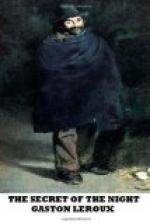While Rouletabille urged his view, the Emperor let him talk on and on, and now his eyes were dim.
“Is it possible that Natacha has not been the accomplice, in all, of Michael Nikolaievitch?” he demanded. “It was she who opened her father’s house to him that night. If she was not his accomplice she would have mistrusted him, she would have watched him.”
“Sire, Michael Nikolaievitch was a very clever man. He knew so well how to play upon Natacha, and Annouchka, in whom she placed all her hope. It was from Annouchka that she wished to hold the life of her father. It was the word, the signature of Annouchka that she demanded before giving her own. The evening Michael Nikolaievitch died, he was charged to bring her that signature. I know it, myself, because, pretending drunkenness, I was able to overhear enough of a conversation between Annouchka and a man whose name I must conceal. Yes, that last evening, Michael Nikolaievitch, when he entered the datcha, had the signature in his pocket, but also he carried the weapon or the poison with which he already had attempted and was resolved to reach the father of her whom he believed was assuredly to be his wife.”
“You speak now of a paper, very precious, that I regret not to possess, monsieur,” said the Tsar coldly, “because that paper alone would have proved to me the innocence of your protegee.”
“If you have not it, Sire, you know well that it is because I have wished you to have it. The corpse had been searched by Katharina, the little Bohemian, and I, Sire, prevented Koupriane from finding that signature in Katharina’s possession. In saving the secret I have saved General Trebassof’s life, who would have preferred to die rather than accept such an arrangement.”




